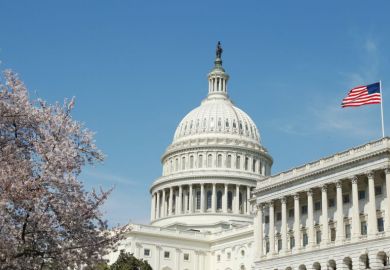The US Congress is moving towards once again rejecting deep cuts in education and research funding proposed by the Trump administration.
In the first major step, the Appropriations Committee of the US House of Representatives approved increases over the current year of $4.4 billion (£3.4 billion) for education spending and $2 billion for the National Institutes of Health.
The 6 per cent rise for the Department of Education compares with a Trump recommendation to cut nearly all non-military spending by about 10 per cent. The administration also had suggested a $4.9 billion cut for the NIH, the leading source of basic science funding for universities.
The committee action in the Democrat-controlled House, on a section of the US budget that contains the largest chunk of spending outside the military, passed in a party-line vote of 30-23.
While some Republicans denounced the increases for the fiscal 2020 budget as excessive, Congress under full Republican control over the previous two years also largely reversed deep reductions in non-military spending sought by the Trump administration.
Key increases in the House’s 2020 budget covering education include a hike of $150, to $6,345, for the maximum annual per-student award in the Pell Grant programme, the main federal subsidy for low-income college students.
The House spending plan also includes boosts for a host of other targeted student aid programmes, and for aid to predominantly black and Hispanic institutions.
Such increases would “have a profoundly positive impact on the millions of college students who rely on federal financial aid to afford college”, a group of three dozen higher education associations wrote to lawmakers.
Despite the history of Congress in supporting such investments, the levels could be tough to sustain in the Republican-controlled Senate given rising federal debt levels and the expiration of a long-term budgetary agreement that reimposes mandatory spending limits. Overriding those limits would require additional congressional votes.
Register to continue
Why register?
- Registration is free and only takes a moment
- Once registered, you can read 3 articles a month
- Sign up for our newsletter
Subscribe
Or subscribe for unlimited access to:
- Unlimited access to news, views, insights & reviews
- Digital editions
- Digital access to THE’s university and college rankings analysis
Already registered or a current subscriber?







